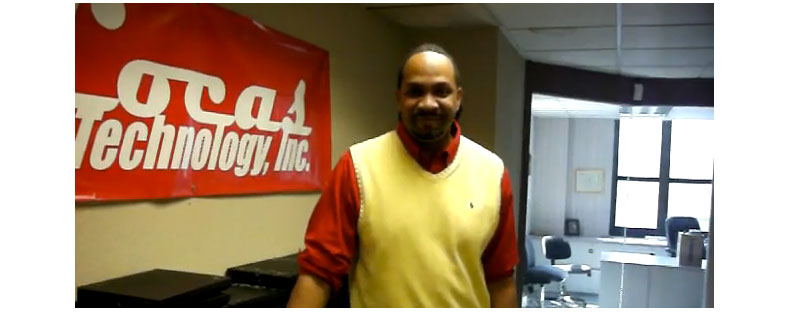Two stories below Digit All Systems’ main testing center on East Lexington Street is a floor-length data center, slowly being filled up with servers.
On an afternoon in July, as Digit All founder Lance Lucas takes Technically Baltimore on a tour of this new facility, he talks giddily, peppering his speech with street vernacular as he describes high school students “wildin’ out” over working in a data center that he hopes will be more state-of-the-art than the two maintained by the Baltimore city government.
The data center is the new home of Digit All Systems’ Street Geeks program, a cloud computing certification program Lucas wants to implement in 2013. Street Geeks is in addition to Digit All Systems’ present offerings: A+ and a variety of other computer certification programs it teaches in several Baltimore city public schools, local nonprofits and the city Housing Authority.
Watch a video-tour of the Street Geeks data center. To donate equipment, contact Digit All Systems:
[youtube https://www.youtube.com/watch?v=OXf5Ct0LUKg]
Alongside Street Geeks—which is being developed with the help of Peter Daniels, a cloud architect at T. Rowe Price who serves as chairman of the board of Digit All Systems—Lucas is looking to develop two other new programs:
- Tech Mentors, beginning in December, is a forum for people working in technology companies in Baltimore city to spend part of their day with students at city schools where Digit All computer certification classes are taught.
- A for-profit company, Digital Desk, which will make all of Digit All’s computer certification curriculum available online. The national strategy, Lucas said, is to make the coursework available through a platform similar to Blackboard.
“[Digit All’s] whole thing is to give kids the skills to first get their own jobs, but then to start their own businesses,” Lucas said.
But incredulity about the value of A+ certification, and certifications like it, exists, as a spirited discussion on the Baltimore Tech Facebook group illustrated after a notice about Digit All’s Tech Mentors program was posted. The main question debated? Whether certification courses provide people the requisite qualifications to land jobs in the IT industry right now and in the years to come.
The focus of such a question is on real-world outcomes. That is, ensuring any technology training today isn’t equipping people, and college-age or younger students especially, with an obsolete education, or a set of skills that will soon be dated.
Mike Brenner, co-founder of the new incubation and education space Betamore (and, full disclosure, a partner with Technically Baltimore), said it comes down to whether “we want to be teaching students how to open up computers and replace RAM cards,” or whether we want students to become software engineers, as entrepreneur Mike Subelsky outlined in his One Big Idea.
“We’re creating a workforce of lemmings, not a workforce of thinkers,” said Brenner. “Put Google and Android and Mozilla in schools rather than CISCO and Microsoft.”
Put differently: do we create more value for people by making them technicians or creators of content? Should we ensure that people are both technicians and content-creators?
In the rapidly changing world of technology education, those are fair questions to ask. What’s most important: network computing certifications, computer science degrees or individual courses focused on narrow, unique topics—Ruby on Rails programming, for instance—for which students can receive a different type of certification in the form of an “open badge”?
“There are a lot of dueling ideologies about how we should advance our technology education,” said Lucas. “I think … it’d be best if [Baltimore technologists] could come together to have talks about how to engage the city students. The education benefits the same group, every time, no matter what the different perspectives are.”
Lucas will soon supplement the certification work with a forthcoming technology program Digit All Systems will run out of the new Downtown Cultural Arts Center at the intersection of West Mulberry and North Howard streets. Lucas said he’s seeking funding now to purchase a number of Mac computers. The hope is to teach Adobe Final Cut Pro and Adobe for design, including InDesign, Photoshop and Illustrator.
But he’s bullish about the opportunities Digital Desk and Street Geeks could create for Baltimore’s youth. Lucas thinks Digital Desk will be the way teachers worldwide can teach the cybersecurity curriculum Digit All Systems has developed in Baltimore, let alone the way to share Digit All’s cybersecurity courses in a region that will employ more than 13,000 people in the field.
And Street Geeks, said Lucas, could become the way Baltimore’s students find work, as cloud computing is expected to create 14 million jobs by 2015.
“You might even have people move into Baltimore so they can … get this type of technical training,” said Lucas, sounding adorably naïve, yet striking a hopeful tone. “And instead of coming to our neighborhoods for football players, basketball players and rappers, [companies will] be coming for cloud technicians or cloud engineers.”







